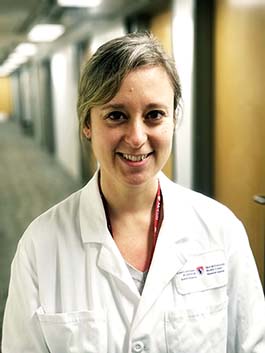
Fil d'Ariane
- Nouvelles et événements
- Nouvelles
- Content
- Une scientifique de l’IR-CUSM reçoit une bourse Terry Fox pour étudier les sarcomes métastatiques
null Une scientifique de l’IR-CUSM reçoit une bourse Terry Fox pour étudier les sarcomes métastatiques
 Source : Institut de recherche Terry Fox
Source : Institut de recherche Terry Fox
Alors que Terry Fox approchait de la ville de Thunder Bay, en Ontario, le 1er septembre 1980, il a ressenti une étrange douleur à la poitrine. Le jeune homme de 22 ans toussait depuis des jours; il a cependant attendu que la douleur rende sa respiration difficile pour mettre fin à son marathon et pour aller consulter un médecin.
À l’hôpital, Terry Fox a appris que le sarcome lui ayant coûté la jambe droite trois ans auparavant était de retour et qu’il s’était de plus propagé dans ses poumons. Le lendemain, le jeune homme a pris l’avion pour retourner chez lui, en Colombie Britannique, mettant un terme à son marathon de l’espoir. Le pronostic était mauvais pour lui – les sarcomes métastatiques sont presque toujours mortels. Terry Fox a combattu la maladie pendant des mois, mais il est décédé le 28 juin 1981.
« Malheureusement, les choses n’ont pas beaucoup changé au cours des quarante dernières années, et le cas de Terry Fox est encore assez typique lorsqu’il est question de sarcomes métastatiques, explique la chercheuse Livia Garzia, Ph. D., généticienne et spécialiste des cancers pédiatriques à l’Institut de recherche du Centre universitaire de santé McGill (IR-CUSM). Nous disposons en règle générale de moyens efficaces pour nous attaquer à la tumeur primaire; toutefois, si des métastases se forment, nous avons très peu d’options de traitements. »
Au Canada, chaque année, environ 200 jeunes (enfants, adolescents et jeunes adultes) reçoivent un diagnostic de sarcome. Il existe plus de 50 principaux types de sarcomes; ils s’attaquent aux os (comme dans le cas de Terry Fox) ou aux tissus mous comme la graisse, les muscles ou les tissus conjonctifs. Bien que les tumeurs primaires puissent normalement être traitées grâce à une combinaison de chimiothérapie, de chirurgie et de radiothérapie, dans 30 à 40 pour cent des cas, le cancer se manifeste de nouveau dans d’autres parties du corps, formant de nouvelles tumeurs, appelées métastases.
Les sarcomes métastatiques sont presque toujours résistants au traitement, et l’on comprend très peu de choses sur ces tumeurs. Cette situation s’explique en partie parce qu’il est impossible de retirer ces tumeurs par voie chirurgicale; cela signifie qu’il existe très peu d’échantillons humains de sarcomes métastatiques.
La Dre Garzia espère changer la donne, grâce à une bourse qu’elle a récemment reçue pour des recherches novatrices, octroyée par l’Institut de recherche Terry Fox. Cette bourse lui procurera plus de 450 000 $ au cours des trois prochaines années, afin de lui permettre d’étudier comment et pourquoi certains sarcomes forment des métastases. Les travaux de la Dre Garzia ne se concentreront pas sur le type exact de sarcome qui a emporté Terry Fox; elle espère cependant qu’en identifiant les signes précoces de dissémination métastatique, elle pourra découvrir quelles tumeurs sont plus à risque de devenir métastatiques et trouver par la suite de nouveaux traitements pour les enfants et pour les jeunes adultes atteints de ces formes de cancer.
« La bourse de l’Institut Terry Fox nous permettra de développer des sarcomes humains dans des modèles murins. Nous pourrons ainsi étudier les différences génétiques entre la tumeur primaire et les métastases. Cette étude nous permettra de comprendre comment la chirurgie et la chimiothérapie modifient la configuration génétique de ces tumeurs et pourquoi elles deviennent résistantes au traitement, explique la Dre Garzia. Ces recherches nous aideront à trouver des moyens astucieux de prévenir la formation de métastases et d’identifier des moyens pouvant être utilisés pour concevoir des traitements spécifiques contre les métastases. »
La bourse de l’Institut Terry Fox jumellera la Dre Garzia avec un groupe de chercheurs financés par l’Institut de recherche Terry Fox, dirigés par le Dr Sean Egan, biologiste cellulaire à l’Hôpital pour enfants de Toronto (Sick Kids Hospital in Toronto). Ce dernier dirige le projet Killing the Hydra: Genetic dissection of actionable targets required for maintenance of metastatic disease; il s’agit d’un projet du programme Nouvelles frontières Terry Fox. L’équipe du Dr Egan a recours à des méthodes similaires pour étudier les voies de dissémination métastatique dans les cancers du cerveau et les cancers du sein. Grâce à ce mentorat et à la bourse qu’elle vient de recevoir, la Dre Garzia espère faire la lumière sur les sarcomes métastatiques et donner aux patients atteints de cette maladie mortelle l’espoir dont ils ont grandement besoin.
—publié le 12 décembre 2018